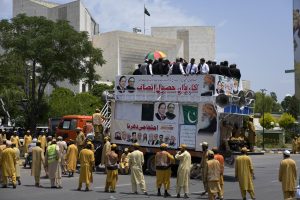Munir Ahmed

Supporters of Pakistan Democratic Movement, an alliance of the ruling political parties, take part in a rally outside the Supreme Court in Islamabad, Pakistan, Monday, May 15, 2023.Credit: AP Photo/Anjum Naveed
Thousands of Pakistani government supporters converged on the country’s Supreme Court on Monday, in a rare challenge to the nation’s judiciary. Protesters demanded the resignation of the chief justice over ordering the release of former Prime Minister Imran Khan.
The Pakistan Democratic Alliance, a grouping of 13 political parties affiliated with the ruling Pakistan Muslim League, called for the protests.
Khan’s dramatic detention from a courtroom in Islamabad last week sparked outrage among legions of his supporters, who set buildings and vehicles ablaze across major cities and attacked military facilities. At least 10 people died in pitched battles with police. Dozens were injured and thousands of Khan’s supporters from his Pakistan Tehreek-e-Insaf party were arrested.
The Supreme Court, headed by Chief Justice Umar Ata Bandial, intervened and ordered him to be freed. Bandial criticized the way Khan was arrested and said that his detention was unlawful. But the government and its allies have accused the top judge of bias.
“Our peaceful protest is against Chief Justice (Umar Ata Bandial) for facilitating the release of Imran Khan,” said Fazalur Rehman, the head of the Pakistan Democratic Alliance.
The radical Islamist political party Jamiat-e-Ulema-Islam is leading the protest call. Also, as part of the alliance, the Pakistan People’s Party led by Bilawal Bhutto Zardari — the son of assassinated Prime Minister Benazir Bhutto — is joining the protest.
In a televised statement on Monday, Defense Minister Khawaja Mohammad Asif accused the Supreme Court of siding with Khan. He suggested the court “examine the conduct of the chief justice” and take legal action against him.
Khan claimed in a tweet Monday that the sit-in is being orchestrated to remove the chief justice.
The protest is a sign of escalating tensions between the judiciary and the government of Prime Minister Shehbaz Sharif, who replaced Khan after his ouster in a no-confidence vote in Parliament in April 2022.
Confrontations between the government and supreme court judges are rare in Pakistan.
In 1997, then-Prime Minister Nawaz Sharif demanded the removal of Chief Justice Sajjad Ali Shah. A decade later, former President Pervez Musharraf placed Chief Justice Iftikhar Mohammad Chaudhry under house arrest after he refused to resign for accusing the then-leader of corruption.
Judges have grown in power since then. The Supreme Court has ousted two prime ministers from office: Nawaz Sharif and Yousaf Raza Gillani.
Khan was dramatically arrested from a courtroom in Islamabad and dragged out by agents of the National Accountability Bureau last Tuesday on charges of accepting millions of dollars worth of property in exchange for providing benefits to a real estate tycoon.
A year after his ouster, Khan, a former cricket star turned Islamist politician, is still widely popular in Pakistan. He blames Prime Minister Shehbaz Sharif, the country’s military, and Washington for his removal from power, saying it was part of a conspiracy to discredit him. All three have denied the charge.
No comments:
Post a Comment